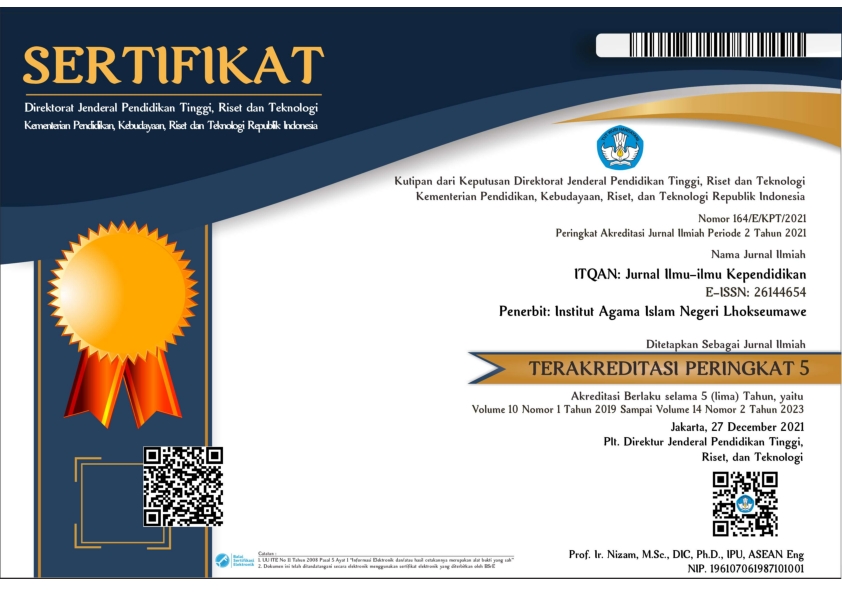Konstruksi Keilmuan Islam (Studi Pemikiran Ibnu Rusyd tentang Ontologi dan Epistimologi)
Main Article Content
Agus Salim Salabi
This study aims to deeply construct Islamic scholarship from the point of view of the great Islamic scholar Ibn Rushdi. This research is a qualitative type of literature method. Data collection techniques were taken from relevant reference sources from research sources and primary books. The results of the research show that broadly speaking, ontology and epistemology are related to two main questions (a) what can be known? (what can be known?) and b) how can it be known? (how can it be known?). The first question relates to the source of knowledge, the second question relates to how to acquire knowledge. Based on this, ontology and epistemology are related to two main studies, namely where knowledge comes from, and how knowledge should be extracted. According to Ibn Rushd, human knowledge is obtained through three potentials, namely the power of the senses (al-quwwah al-ḥasāsah), the power of imagination (al-quwwah al-mutakhayyilah), and the power of thought (al-quwwah an-nāṭiqah). To get general conclusions from the observations on particular objects above, there are three stages mentioned by Ibn Rushd, namely: 1) abstraction, 2) combination, 3) assessment.
Al-Attas, S. M. N. (2005). Islamic philosophy: An introduction. Journal of Islamic Philosophy, 1(1), 11–43.
Arifin, M. (2000). Filsafat Pendidikan Islam. Jakarta: PT Bumi Aksara, Cetakan Keenam.
Asyarie, M., Fatimah, I., & Islam, L. S. F. (1992). Filsafat Islam Kajian Ontologis, Epistemologis, Aksiologis, Historis, Prospektif.
Bagheri Noaparast, K. (2016). Islam and the Philosophy of Education: The Three Approaches. In M. A. Peters (Ed.), Encyclopedia of Educational Philosophy and Theory (pp. 1–6). https://doi.org/10.1007/978-981-287-532-7_334-1
Bahrum, B. (2013). Ontologi, Epistemologi Dan Aksiologi. Sulesana: Jurnal Wawasan Keislaman, 8(2), 35–45.
Bird, A. (2006). Philosophy of Science. https://doi.org/10.4324/9780203133972
Fakhry, M. (1954). The Theocratic Idea of the Islamic State in Recent Controversies. International Affairs (Royal Institute of International Affairs 1944-), 30(4), 450–462.
Fakhry, M. (2013). Islamic Occasionalism: And its Critique by Averroes and Aquinas. Routledge.
Fakhry, M. (2014a). Al-Farabi, Founder of Islamic Neoplatonism: His Life, Works and Influence. Simon and Schuster.
Fakhry, M. (2014b). Averroes: His Life, Work and Influence. Simon and Schuster.
Hadariansyah, H. (2016). Warisan Intelektual Ibnu Rusyd Dalam Pemikiran Teologi Islam. Jurnal Ilmiah Ilmu Ushuluddin, 12(1), 123. https://doi.org/10.18592/jiu.v12i1.288
Hamid, R. (2011). Pengaruh Falsafat Ibn Rusyd di Barat.
Jaeni, M., & Huda, M. N. (2021). Ibn Rusyd’s Epistemology and The Future of Islamic Knowledge Development. Proceeding International Conference on Islam and Education (ICONIE), 1(1), 715–735.
Kennedy-Day, K. (2003). Books of Definition in Islamic Philosophy. https://doi.org/10.4324/9780203221372
Ladyman, J. (2012). Understanding Philosophy of Science. https://doi.org/10.4324/9780203463680
Lea Clark, C. (2007). Aristotle and Averroes: The Influences of Aristotle’s Arabic Commentator upon Western European and Arabic Rhetoric. Review of Communication, 7(4), 369–387. https://doi.org/10.1080/15358590701596955
López-Farjeat, L. X. (2021). Classical Islamic Philosophy. https://doi.org/10.4324/9781315389288
Mahmud, A. (2019). Jejak Pemikiran Al-Ghazali dan Ibnu Rusyd dalam Perkembangan Teologi Islam. Sulesana: Jurnal Wawasan Keislaman, 13(2), 183–198.
Meri, J. W. (2018). Routledge Revivals: Medieval Islamic Civilization (2006) An Encyclopedia. https://doi.org/10.4324/9781315162447
Nasr, S. H., & Leaman, O. (Eds.). (2013). History of Islamic Philosophy. https://doi.org/10.4324/9780203824597
Nuryana, Z. (2019). Curriculum 2013 and the Future of Islamic Education in Indonesia.
Özervarlı, M. S. (2015). 18 Arbitrating between al-Ghazālī and the Philosophers. In Islam and Rationality (pp. 375–397). https://doi.org/10.1163/9789004290952_019
Prasetyo, M. A. M. (2018). Desain Kurikulum IAIN Lhokseumawe (Studi Analisis Mata Kuliah: Filsafat Manajemen Jurusan Manajemen Pendidikan Islam). Idarah (Jurnal Pendidikan Dan Kependidikan), 2(2), 1–17.
Raka, S. P. (2021). Filsafat Ketuhanan Ibn Rusyd. UIN Raden Intan Lampung.
Salabi, A. S. (2020). Efektivitas Dalam Implementasi Kurikulum Sekolah. Education Achievement: Journal of Science and Research.
Saleh, S. Z. (2009). Kritik Ibn Rusyd Terhadap Pandangan Para Filsuf Tentang Ketuhanan. TSAQAFAH, 5(1), 97. https://doi.org/10.21111/tsaqafah.v5i1.149
Siegel, H. (2009). The Oxford Handbook of Philosophy of Education. Oxford University Press.
Soleh, A. K. (2010). Upaya Ibn Rusyd Mempertemukan Agama dan Filsafat. Studia Philosophica et Theologica, 10(2), 238–257.
Sumantri, J. S. (2003). Filsafat Ilmu Sebuah Pengantar Populer. Jakarta: Pustaka Sinar Harapan.
Susanto, A. (2021). Filsafat ilmu: Suatu Kajian dalam Dimensi Ontologis, Epistemologis, dan Aksiologis. Bumi Aksara.
Ul-Haq, S., & Westwood, R. (2012). The Politics of Knowledge, Epistemological Occlusion and Islamic Management and Organization Knowledge. Organization, 19(2), 229–257. https://doi.org/10.1177/1350508411429399
Urvoy, D. (1991). Ibn Rushd (Averroes).
Urvoy, D. (2020). Ibn Rushd. In History of Islamic Philosophy. Routledge.
Wafi, A. (2017). Konsep dasar Kurikulum Pendidikan Agama Islam. EDURELIGIA: Jurnal Pendidikan Agama Islam, 1(2), 133–139.
Wijaya, A. (2009). Teori Interpretasi Al-Qur’an Ibn Rusyd, Kritik Ideologis-Hermeneutis. LKIS PELANGI AKSARA.
Zarkasyi, H. F. (2012). Misykat: Refleksi tentang Islam Westernisasi & Liberalisasi. INSISTS.
Zarkasyi, H. F., Zarkasyi, A. F., Prayogo, T. I., & Nur Rifa Da’i, R. A. (2020). Ibn Rushd’s Intellectual Strategies on Islamic Theology. Jurnal Ilmiah Islam Futura, 20(1), 19. https://doi.org/10.22373/jiif.v20i1.5786



